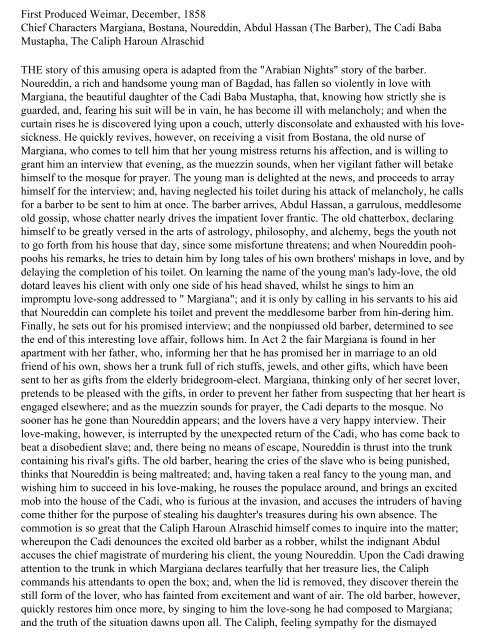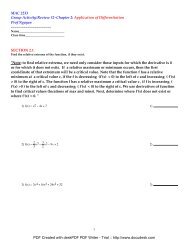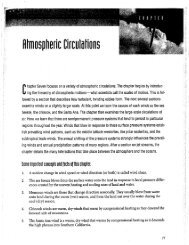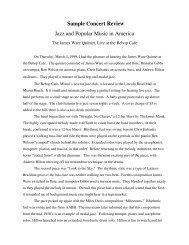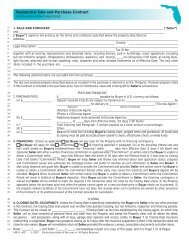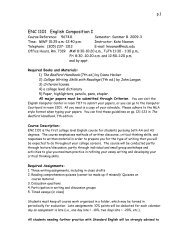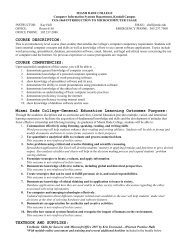Opera Plots I - MDC Faculty Home Pages
Opera Plots I - MDC Faculty Home Pages
Opera Plots I - MDC Faculty Home Pages
You also want an ePaper? Increase the reach of your titles
YUMPU automatically turns print PDFs into web optimized ePapers that Google loves.
First Produced Weimar, December, 1858<br />
Chief Characters Margiana, Bostana, Noureddin, Abdul Hassan (The Barber), The Cadi Baba<br />
Mustapha, The Caliph Haroun Alraschid<br />
THE story of this amusing opera is adapted from the "Arabian Nights" story of the barber.<br />
Noureddin, a rich and handsome young man of Bagdad, has fallen so violently in love with<br />
Margiana, the beautiful daughter of the Cadi Baba Mustapha, that, knowing how strictly she is<br />
guarded, and, fearing his suit will be in vain, he has become ill with melancholy; and when the<br />
curtain rises he is discovered lying upon a couch, utterly disconsolate and exhausted with his lovesickness.<br />
He quickly revives, however, on receiving a visit from Bostana, the old nurse of<br />
Margiana, who comes to tell him that her young mistress returns his affection, and is willing to<br />
grant him an interview that evening, as the muezzin sounds, when her vigilant father will betake<br />
himself to the mosque for prayer. The young man is delighted at the news, and proceeds to array<br />
himself for the interview; and, having neglected his toilet during his attack of melancholy, he calls<br />
for a barber to be sent to him at once. The barber arrives, Abdul Hassan, a garrulous, meddlesome<br />
old gossip, whose chatter nearly drives the impatient lover frantic. The old chatterbox, declaring<br />
himself to be greatly versed in the arts of astrology, philosophy, and alchemy, begs the youth not<br />
to go forth from his house that day, since some misfortune threatens; and when Noureddin poohpoohs<br />
his remarks, he tries to detain him by long tales of his own brothers' mishaps in love, and by<br />
delaying the completion of his toilet. On learning the name of the young man's lady-love, the old<br />
dotard leaves his client with only one side of his head shaved, whilst he sings to him an<br />
impromptu love-song addressed to " Margiana"; and it is only by calling in his servants to his aid<br />
that Noureddin can complete his toilet and prevent the meddlesome barber from hin-dering him.<br />
Finally, he sets out for his promised interview; and the nonpiussed old barber, determined to see<br />
the end of this interesting love affair, follows him. In Act 2 the fair Margiana is found in her<br />
apartment with her father, who, informing her that he has promised her in marriage to an old<br />
friend of his own, shows her a trunk full of rich stuffs, jewels, and other gifts, which have been<br />
sent to her as gifts from the elderly bridegroom-elect. Margiana, thinking only of her secret lover,<br />
pretends to be pleased with the gifts, in order to prevent her father from suspecting that her heart is<br />
engaged elsewhere; and as the muezzin sounds for prayer, the Cadi departs to the mosque. No<br />
sooner has he gone than Noureddin appears; and the lovers have a very happy interview. Their<br />
love-making, however, is interrupted by the unexpected return of the Cadi, who has come back to<br />
beat a disobedient slave; and, there being no means of escape, Noureddin is thrust into the trunk<br />
containing his rival's gifts. The old barber, hearing the cries of the slave who is being punished,<br />
thinks that Noureddin is being maltreated; and, having taken a real fancy to the young man, and<br />
wishing him to succeed in his love-making, he rouses the populace around, and brings an excited<br />
mob into the house of the Cadi, who is furious at the invasion, and accuses the intruders of having<br />
come thither for the purpose of stealing his daughter's treasures during his own absence. The<br />
commotion is so great that the Caliph Haroun Alraschid himself comes to inquire into the matter;<br />
whereupon the Cadi denounces the excited old barber as a robber, whilst the indignant Abdul<br />
accuses the chief magistrate of murdering his client, the young Noureddin. Upon the Cadi drawing<br />
attention to the trunk in which Margiana declares tearfully that her treasure lies, the Caliph<br />
commands his attendants to open the box; and, when the lid is removed, they discover therein the<br />
still form of the lover, who has fainted from excitement and want of air. The old barber, however,<br />
quickly restores him once more, by singing to him the love-song he had composed to Margiana;<br />
and the truth of the situation dawns upon all. The Caliph, feeling sympathy for the dismayed


